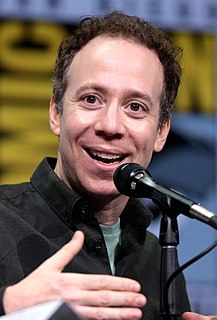A Quote by Michio Kaku
If we do get a quantum theory of spacetime, it should answer some of the deepest philosophical questions that we have, like what happened before the big bang?
Related Quotes
Modern thinking is that time did not start with the big bang, and that there was a multiverse even before the big bang. In the inflation theory, and in string theory, there were universes before our big bang, and that big bangs are happening all the time. Universes are formed when bubbles collide or fission into smaller bubles.
What I do for living, working on something called string theory which we think may answer the fundamental question: Are there other universes? Can you go through a black hole? Can you warp the fabric of space and time and meet your mother before you were born? These are all questions that in principle string theory should be able to answer.
We could tell them [alien civilization] things that we have discovered in the realm of mathematical physics, but there is stuff that I would like to know. There are some famous problems like how to bring gravitation and quantum physics together, the long-sought-after theory of quantum gravity. But it may be hard to understand the answer that comes back.
Observations indicate that the universe is expanding at an ever-increasing rate. It will expand forever, getting emptier and darker. Although the universe doesn’t have an end, it had a beginning in the Big Bang. One might ask what is before that but the answer is that there is nowhere before the Big Bang just as there is nowhere south of the South Pole.
Big bang cosmology is probably as widely believed as has been any theory of the universe in the history of Western civilization. It rests, however, on many untested, and in some cases untestable, assumptions. Indeed, big bang cosmology has become a bandwagon of thought that reflects faith as much as objective truth.






























